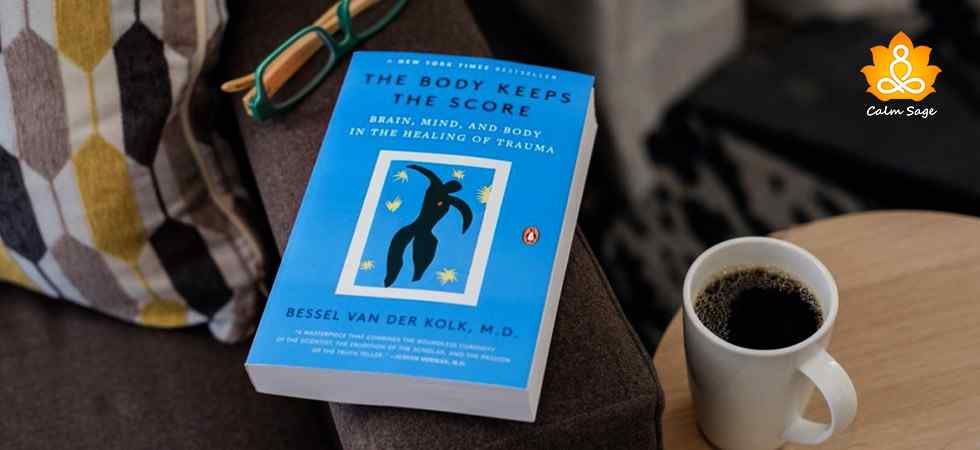The Body Keeps The Score | Book Summary

The Body Keeps the Score is a book about how one can deal with complicated feelings and emotions of trauma. The book talks about various techniques and strategies one can use to deal with trauma healthily.
The Body Keeps The Score: Quick Summary
The book, The Body Keeps The Score authored by Bessel van der Kolk, entails some important and interesting information on how to deal with the difficult emotion & thoughts and other challenges one experiences because of a traumatic past. The book also uncovers various details about the techniques and strategies used by mental health professionals while helping trauma survivor deal with their past.
About The Author
Bessel van der Kolk is a researcher, author, educator, and psychiatrist from Boston, United States. He was born in the year 1943 and even since his professional career began he has been studying how children and adults deal with traumatic experiences.
He is one of the pioneers in using neuroscience finding and translating them into psychological interventions to help people deal with traumatic experiences. Kolk has successfully integrated science and therapy and has been doing this since the 1970s.
His book, The Body Keeps The Score is one of his best-selling books. It has been published in almost 38 languages. In the book, Kolk explains the functions of the brain, how trauma impacts, and techniques that help in dealing with trauma.
“Being able to feel safe with other people is probably the single most important aspect of mental health; safe connections are fundamental to meaningful and satisfying lives.”
– The Body Keeps the Score
“The Body Keeps The Score”: Detailed Summary
The Body Keeps The Score has a very different approach, it focuses on what you CAN do rather than a lecture on what’s the right thing to do or some random coping strategies for trauma. Some critics even say that the author has encapsulated his entire research work in these 464 pages he called The Body Keeps The Score.
The book talks about how trauma can have a huge impact on a person’s life. Kolks has very precisely talked about how trauma messes with the mind keeping neuroscience in mind. He successfully attempted to give a perfectly understandable explanation of how the brain works when you are hit by trauma. The book also covers various techniques therapists use to treat and heal trauma victims.
“The Body Keeps The Score” Summary- Chapter wise
Chapter 1: The Rediscovery of Trauma
The book begins by talking about how trauma distorts the brain’s reality which was found in Rorschach tests. Kolks talks about his initial work with veterans and how it helped him develop a trauma lens, an approach that helped him in his therapy sessions with survivors of incest. He also talks about the realization that it takes a lot of courage for a trauma survivor to recall the traumatic past. Kolk claims that trauma can happen from any stressful incident leaving the victim emotionally handicapped.
Chapter 2: This is Your Brain on Trauma
In the second chapter Kolk talks about the adaptive power that our brain possesses and how trauma rips that adaptive ability of the brain. He writes in favor of Francine Shapiro’s Adaptive Information Processing (AIP) theory of EMDR therapy which states that the brain keeps moving towards health unless the flow is blocked or interrupted. He calls the trauma-surviving brain a ‘smoke detector’ which has lost the capacity to evaluate danger and sense of safety. This chapter talks about how the brain reacts when in trauma.
Chapter 3: The Minds of Children
The third section of the book covers information about the impact of childhood trauma, abuse, and neglect on a developing brain. He states that there is no drug or therapeutic approach so powerful that can completely change the way one’s brain is wired but early trauma has the capabilities of completely changing the way a child’s mind is wired. Kolks also talks about how the higher authorities have neglected the need for proper diagnostic criteria for child Developmental Trauma Disorders.
Chapter 4: The Imprint of Trauma
This chapter entails a very detailed and easily understandable description of a normal brain and a traumatized brain. He talks about intense emotional arousal in post-traumatic stress disorder and even goes back to the initial research of Charcot and Pierre Janet. He also mentions Freud’s work on how energetic reaction is reduced upon remembering and releasing feelings of a traumatic past.
Chapter 5: Paths to Recovery
In the final chapter, Kolks discusses some important and effective steps involved in effective trauma therapy such as; a) finding a way to calm yourself; b) learning to maintain calm when close to the trigger; c) learning to be in the present; d) don’t keep secrets from self. He also talks about various methods that can help deal with trauma like yoga, EMDR, Schwartz’s Internal Family Systems, Pesso’s PBSP psychomotor therapy, neurofeedback, movement, theater, and dance.
Our Review
The summary of “The Body Keeps The Score” is just the tip of an iceberg. Bessel van der Kolk has put his entire life’s research into this book. This book is a must-read for those people who want to find out what trauma has done to their brain and how they can recover from it.
The best part about the book is that it’s easy to understand, even if you’re new to learning about trauma and its effects. You can see how well rooted the concept of brain and trauma are in Kolks’ mind as it translates in his writing with complete transparency.
If you think “The Body Keeps The Score” is for you, you can buy it now and get a better understanding of your trauma and how your brain responds to it.
The book retails for;
- Kindle Edition: $14.99
- Audible Audiobook: $0.00
- Paperback: $11.40
- Hardcover: $19.39
The body keeps the score rating;
| Goodreads: | 4.5/5 |
|---|---|
| Mental Health @ Home | 5/5 |
| Calm Sage | 5/5 |
That’s All Folks!
Thanks for reading!
Take care, stay safe and keep reading!




















